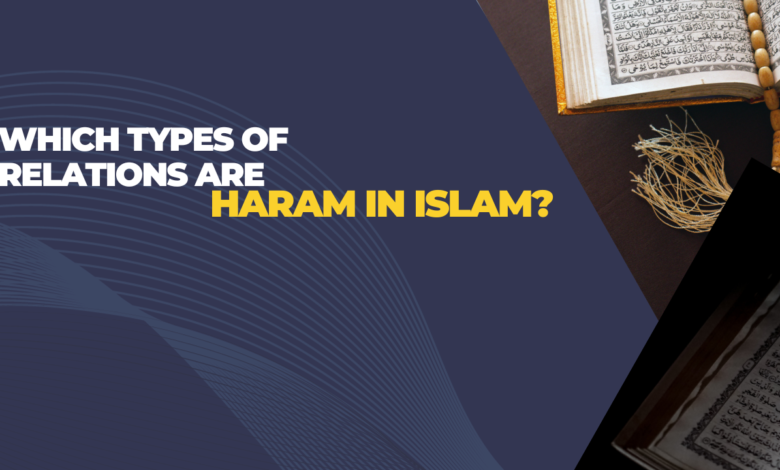Which types of Relations are Haram in Islam?
Understanding the Boundaries of Permissible Relationships in Islam

Which types of Relations are Haram in Islam?
“Haram” in Islam refers to actions, behaviors, or relationships that are considered sinful, prohibited, or forbidden according to Islamic law.

Introduction
Islam, one of the world’s major religions, provides a comprehensive set of guidelines for individuals on how to lead a morally upright life. Central to this guidance is the concept of “halal” and “haram.” “Halal” refers to what is permissible or lawful, while “haram” designates actions, behaviors, or relationships that are considered sinful, prohibited, or forbidden. In the context of relationships, Islam places certain restrictions on interactions between individuals, ensuring that they maintain modesty, respect, and ethical conduct. This article explores the types of relationships that are considered “haram” in Islam.
Illicit Sexual Relationships
Islam explicitly forbids any sexual relations outside of a lawful marriage between a man and a woman. This prohibition includes premarital sex and extramarital affairs. Engaging in such activities is considered a grave sin and a violation of Islamic principles. Adultery is condemned, and the punishment for this act can be severe in some Islamic legal systems.
Also check.
- What is Islam and Iman?
- What is Indo Islamic Culture?
- What is in Heaven Islam?
- When did Sunni Islam Start?
- What does Jihad Mean?
Homosexual Relationships
Homosexual relationships are generally considered “haram” in Islam. The Quran contains verses that emphasize the importance of heterosexual marriage and procreation. Islamic jurisprudence varies on the severity of punishment for homosexual acts, but many scholars agree that same-sex relationships are prohibited.
Incestuous Relationships
Incestuous relationships, involving sexual relations or marriage between close blood relatives, are forbidden in Islam. The Quran explicitly prohibits marrying one’s parents, children, siblings, and a few other close relatives. These prohibitions are in place to maintain family structure, prevent genetic disorders, and uphold the moral values of Islam.
Extramarital Relationships
Extramarital relationships, including affairs and infidelity, are strongly discouraged and considered “haram” in Islam. The sanctity of marriage is highly valued, and engaging in activities that undermine the trust and commitment within a marriage is a grave sin. Islam encourages spouses to maintain strong bonds and resolve disputes amicably.
Pre-Marital Relationships
Islam promotes modesty and discourages premarital relationships. Interactions between unmarried individuals of the opposite sex should be conducted with respect and modesty. Physical contact and emotional attachments outside of marriage are discouraged to prevent temptation and maintain the sanctity of marital relationships.
Unlawful Business Relationships
Unlawful business relationships, such as those involving usury (riba) or engaging in forbidden trades (e.g., selling alcohol or pork), are considered “haram” in Islam. Muslims are encouraged to engage in halal (permissible) business activities that do not exploit or harm others.
Slanderous or Defamatory Relationships
Engaging in slanderous or defamatory relationships, which harm the reputation or dignity of others, is strictly forbidden in Islam. The religion places a significant emphasis on truthfulness, kindness, and respect for others.
Conclusion
Islam provides a comprehensive framework for ethical behavior and relationships. The types of relationships considered “haram” in Islam are those that go against the core principles of modesty, respect, and morality that the religion advocates. It’s important to note that while certain relationships are considered “haram,” forgiveness and repentance are integral aspects of Islamic teachings. Muslims are encouraged to seek forgiveness and amend their ways if they have engaged in “haram” relationships. Additionally, interpretations and enforcement of these guidelines may vary among different Islamic communities and scholars. Therefore, it’s essential for individuals to seek guidance from qualified scholars and adhere to the teachings of Islam as understood in their particular context.

FAQs
What does “haram” mean in Islam?
“Haram” in Islam refers to actions, behaviors, or relationships that are considered sinful, prohibited, or forbidden according to Islamic law.
What is the importance of maintaining halal relationships in Islam?
Maintaining halal (permissible) relationships in Islam is essential to uphold the principles of modesty, morality, and ethical conduct that the religion advocates.
Are all sexual relationships outside of marriage considered haram in Islam?
Yes, Islam explicitly prohibits all sexual relationships outside of a lawful marriage between a man and a woman, including premarital and extramarital relationships.
Are homosexual relationships completely prohibited in Islam?
Homosexual relationships are generally considered “haram” in Islam. While the severity of punishment varies among Islamic jurisprudences, same-sex relationships are generally discouraged.
What is the punishment for engaging in extramarital relationships in Islam?
Punishments for extramarital relationships vary among different Islamic legal systems. In some countries, there can be severe penalties, but it ultimately depends on the jurisdiction and interpretation of Islamic law.
Are there any exceptions to the prohibition of incestuous relationships in Islam?
There are no exceptions to the prohibition of incestuous relationships in Islam. The Quran explicitly forbids sexual relations or marriage between close blood relatives.
Why does Islam discourage premarital relationships?
Islam discourages premarital relationships to maintain modesty, prevent temptation, and uphold the sanctity of marriage, which is highly valued in the religion.
What are some examples of unlawful business relationships in Islam?
Unlawful business relationships in Islam include usury (riba) and involvement in trades of prohibited items such as alcohol and pork. Muslims are encouraged to engage in halal (permissible) business activities.
What role does forgiveness play in Islam regarding “haram” relationships?
Forgiveness and repentance are integral aspects of Islamic teachings. Muslims are encouraged to seek forgiveness and amend their ways if they have engaged in “haram” relationships.


